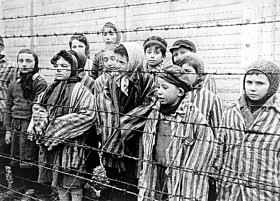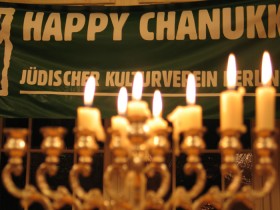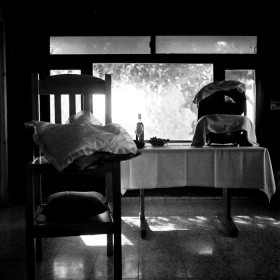
Surviving children in the main concentration camp, Auschwitz. This still from documentary footage shot by Alexander Voronzow shows Tomasz Szwarz, Alicja Gruenbaum, Solomon Rozalin, Gita Sztrauss, Wiera Sadler, Marta Wiess, Boro Eksztein, Josef Rozenwaser, Rafael Szlezinger, Gabriel Nejman, Gugiel Appelbaum, Mark Berkowitz, Pesa Balter, Rut Muszkies, Miriam Friedman, and Miriam and Eva Mozes. Licensed for the public domain by the United States Holocaust Memorial Museum.
Seventy years ago to this day, the Soviet Army liberated the death camps Auschwitz I and II. Almost ten years ago, the anniversary was designated International Holocaust Remembrance Day. Although I’ve been reflecting on representations of the Holocaust in art, literature, and philosophy for many years, I remain irritatingly little affected by today’s date, January 27. In most European countries, official events will once again collectively recall that breach of civilization and commemorate those who were systematically murdered. So too will Germany. Here, the decision to officially commemorate the victims of the Holocaust on this day was reached in 1996—not least because → continue reading

Hanukkah Candleholder at the 15th Hanukkah Ball of the Jewish Cultural Center, Berlin 12.12.2004 © Photo: Igor Chalmiev, gift of the Jewish Cultural Center to the Jewish Museum Berlin
25 years ago today, on 22 January, 1990, the Jewish Cultural Center was founded. One month earlier, on 13 December, 1989, the press agency ADN published an appeal in numerous East German newspapers. It announced a new coalition of Jews living in East Germany who were committed to spreading the knowledge of Jewish culture and history. The appeal was not an accident:
As early as 1986, secular Jews had found themselves gathering, at the invitation of the Jewish Congregation of (East) Berlin, to explore their Jewish roots – a heritage that no longer played any role in their parents’ identities. A group called “We for us – Jews for Jews” formed out of this second generation of political emigrants who had returned to Germany and grown up in the East. During their regular meetings → continue reading

Before the circumcision ceremony: the godfather’s chair and the infant carrier with Yair © photo: Birgit Glatzel
Naomi converted to Judaism six years ago. Shortly afterwards she became pregnant, went to live with her boyfriend Avishay in Tel Aviv, and gave birth there to a son, Yair, who was circumcised as Jewish law demands. In the meantime the couple has moved to Berlin and separated. Naomi recently showed me the photos she took at the ceremony and we talked about her thoughts on ritual circumcision, then and now.
Mirjam: What was your very first thought when you heard you were expecting a son?
Naomi: I was delighted. For Avishay and I, it was also clear from the get-go that we’d have him circumcised. But, to be honest, we neither gave the matter much thought nor prepared for it in any way. It is Jewish tradition to → continue reading


